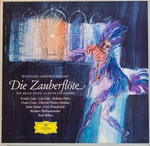|
Back
01/16/2019
Wolfgang Amadeus Mozart: Die Zauberflöte, K.620
Fritz Wunderlich (Tamino), Evelyn Lear (Pamina), Dietrich Fischer-Dieskau (Papageno), Roberta Peters (Queen of the Night), Franz Crass (Sarastro), Lisa Otto (Papagena), Hildegarde Hillebrecht (First lady), Cvetka Ahlin (Second lady), Sieglinde Wagner (Third lady), Hans Hotter (The speaker), Friedrich Lenz (Monostatos), Hubert Hilten (First priest), Martin Vantin (Second priest), Manfed Röhrl (Third priest), Rosl Schwaiger (First boy), Antonia Fahberg (Second boy), Raili Kostia (third boy), James King (First armed man) Martti Talvela (Second armed man), RIAS Chamber Choir, Günther Arndt (chorus master), The Berlin Philharmonic Orchestra, Karl Böhm (conductor)
Recording: Jesus-Christus Kirche, Berlin, Germany (June 1964) – 147’43
Deutsche Grammophon 483 5597 [2CDs reissued plus 1 Blu-ray audio disc] – (Distributed by Universal Music) – Booklet notes and libretto in German, English and French

   
This is a gorgeous recording but with one major qualification. It is one of two recordings of Die Zauberflöte recorded in 1964 by major labels, each with a commanding list of performers. (Note that the two armed men here are Martti Talvela and James King – truly an instance of just showing off!) The “rival” is conducted by Otto Klemperer, and it was released on EMI/Angel, and it omitted the spoken dialogue which is either a big plus or minus, depending on your point of view.
Besides the Klemperer recording, there are many other recordings of this beloved work. One could argue that some of the singers under Böhm aren’t as good as someone on another recording, but in an opera with such a large cast this could hardly not be the case. One example: Roberta Peters has a sweetness in her voice that arguably fails to jibe with the anger the character expresses. (Lucia Popp is amazing on the Klemperer.) Still, Peters’ is truly cherishable, as are so many others in the cast.
One might expect the sound of the Berlin Philharmonic to be overly weighty for modern ears when one considers that the past half century has seen quite a change in the approach to Mozart. The sound is truly sumptuous, but Karl Böhm achieves a buoyancy that counteracts this.
The overall tone of the performance is very stately, and the one feature that suffers is the approach to the Three Boys. Three women are cast in the roles and the conducting for them becomes very hushed and solemn, as opposed to the usual mischievous sparkle that characterizes their appearances in the action and which provide a welcome counterweight to the solemn aspects of the work. Aside from this, it is a recording that deserves its high reputation.
Michael Johnson
|